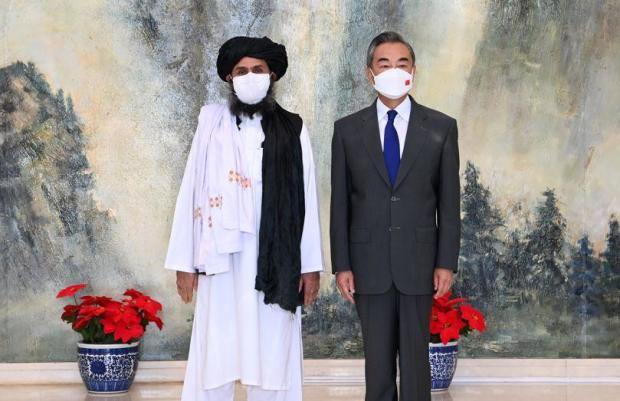With complex hopes and fears over Afghanistan, China likely to treat Taliban "as an equal"
Hong Kong — Beijing is gloating as it watches the messy U.S. exodus from Afghanistan after two decades of war, celebrating it as a massive failure of American leadership and policy. For China, the American withdrawal brings opportunities, but it's not all good news. It carries risks, too.
"Beijing is putting the boot in, noting the ignominious exit, but has the most to lose," Jeff Kingston, Director of Asian Studies at Temple University in Tokyo, told CBS News. He pointed to the potential for destabilization of China's economic influence in Afghanistan, and worries that the return of the Taliban could also mean terrorist insurgents crossing the border into China's Xinjiang province.
"Of course, the big concern is cross-border extremism," said Kingston.
China shares almost 50 miles of border with Afghanistan. Combined with neighboring Tajikistan, another Muslim-majority nation with a porous border, potential insurgents have a span of about 350 miles along the northwest Xinjiang region to try to enter China. That's about the distance from Baltimore to Boston.
The human rights abuses China is widely alleged to have committed in Xinjiang — including incarcerating one million Muslim Uighurs in detention camps — could draw Taliban insurgents or their allies to try to enter China with terrorist intent.
"It's too early to make final judgment. We have to listen carefully and watch very closely and hope they [the Taliban] do the right thing," said Victor Gao, Chair Professor at Soochow University and vice-president of the China Center for Globalization in Beijing.
"But if they do the wrong thing — resort back to extremism and radicalization and threaten Xinjiang — then we need to treat the Taliban government as it is and be very resolute," said Gao.
He declined to say whether he believed Beijing would be willing to commit troops to Afghanistan, but he noted that Russia's 10-year presence in the country from 1979 to 1989, and the U.S.' 20-year presence, both ended in failures.
"I don't think military operations will be effective. A better way is to treat the Taliban government as an equal, to respect the decisions of the Afghan people and to focus on reconciliation," Gao told CBS News. "One litmus test going forward: How will the Taliban deal with women and girls, whether they block women from normal work and prohibit girls from school. If they do these heinous things, they would reveal their true colors. I think the final decision is a bit too early right now. We need to see very carefully what they will transform themselves into."
Resource-hungry China does stand to benefit from closer ties with Afghanistan's new leaders. Afghanistan is rich in minerals, from gold, aluminum and iron ore, to the so-called rare earth metals vital to the manufacture of modern technology.
According to one analysis, Afghanistan has between $1 trillion and $3 trillion worth of rare earth metals — used in everything from cell phones to aircraft and defense technology — within its soil.
In the past month, Beijing has engaged with the Taliban and issued publicly positive words of hopeful expectation, rather than critical threats. But Beijing has not yet recognized the Taliban as the legitimate rulers of Afghanistan.
On Monday, when asked if China intended to recognize the Taliban, Foreign Ministry spokeswoman Hua Chunying said: "China has maintained contact and communication with the Afghan Taliban," and "the Afghan Taliban said on multiple occasions that it hopes to grow sound relations with China… We welcome those statements."
In late July, China's foreign minister Wang Yi notably met with the Taliban's co-founder, Abdul Ghani Baradar in Tianjin, just days after he met U.S. Deputy Secretary of State Wendy Sherman in the same city.
Wang said China "has always respected Afghanistan's sovereignty, independence and territorial integrity," implying that the Taliban should do the same with China. He also called the Taliban "an important military and political force in Afghanistan," and said the group was "expected to play an important role in the country's peace, reconciliation and reconstruction process."
But Wang also stressed that the Taliban must cut all ties with the Muslim group known as the East Turkestan Islamic Movement, or ETIM. The group was founded in Xinjiang and advocates for the separation of Xinjiang and creation of a new state called East Turkestan.
"At this important historical moment, we need to give the Taliban the benefit of the doubt. Be patient for the next weeks and months," said Gao. "The ball is in the Taliban's court as to how they want to be perceived and how they will engage with the international community."





